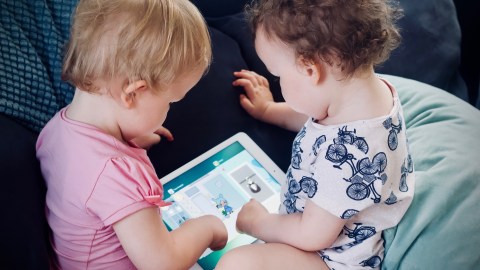Screen time isn’t hurting kids socially, study finds

Photo by Jelleke Vanooteghem on Unsplash
- The dominate cultural assumption claims screen time devastates children’s social skills.
- A recent study in the American Journal of Sociology suggests today’s children are as socially skilled as the preceding peers.
- Parents need to set screen limits, but research shows they should set limits for themselves, too.
Every good parent has a worrier in them. They worry whether their children are eating right, staying safe, enjoying school, building self-esteem, maintaining supportive relationships, developing good habits, and brushing their teeth well—well, good enough at least.
Lucky for today’s parents, older generations have performed the trial runs and scientific studies for many of these concerns. Such research and folk knowledge can provide guidance as they have already weeded out many of the bad practices from generations farther back. There is a notable exception: screen time.
The first members of Gen Z are only now entering adulthood. Educators, pundits, and specialists—many parents themselves—worry this cohort has become socially stunted due to their increased interaction with, and reliance upon, devices for everything from education to entertainment.
But a recent study published in the American Journal of Sociology suggests this concern is overblown.
Screening the evidence
Douglas Downey, professor of sociology at Ohio State University, wanted to test the pervasive cultural concern that today’s children suffer from poorer social skills. He teamed up with Benjamin Gibbs, associate professor of sociology at Brigham Young University, and they did what good sociologists do: They analyzed the best available data.
That data came from the Early Childhood Longitudinal Study, a program overseen by the National Center for Education Statistics. Each of the program’s studies follows a generational cohort from kindergarten to at least fifth grade. It asks teachers, parents, and administrators to assess children on their cognitive, social, emotional, and physical development at home and in school. Teachers assess the students six times from the start of kindergarten to the end of fifth grade, while parents assess their children three times from the beginning of kindergarten to first grade.
Downey and Gibbs compared the data for the class of 1998-99 (19,150 students) and 2010-11 (13,400 students) because, despite both cohorts falling under the Gen Z label, each was raised in wildly different technological worlds.
The year 2010 saw the release of the iPad, the spread of 4G networks, and the launch of the social media decade. But in 1998, screen time was restricted to home-bound TVs and desktop computers—unless you count the endless hours playing Snake on your Nokia 5110.
Despite these dissimilarities, Downey and Gibbs found little variance in how teachers and parents evaluated the children’s social skills.
“In virtually every comparison we made, either social skills stayed the same or actually went up modestly for the children born later,” Downey said in a release. “There’s very little evidence that screen exposure was problematic for the growth of social skills.”
Teachers and parents rated children similarly on self-control, interpersonal skills, the ability to form friendships, and how they handled diversity—even after accounting for factors like screen time use and family makeup. Within the cohorts, social skill trajectories remained similar for heavy-use children as lighter use.
The only exception proved children who accessed online gaming or social networking sites many times a day. These children’s excessive screen time did lead to a slightly lower evaluation of social skills.

Despite concern over kids’ screen time, parents can spend up to 9 hours a day on digital devices.
“Do as I say, not as I do”
Yet, a predominant social assumption is that screen time makes children socially inept. Common sense views screen time as a blue-lit security blanket, a place for children to tuck themselves away from the difficulties of navigating social reality. Unable to interact face-to-face, these children grow to become adult recluses who’ll probably live in a trailer lit dimly only by a lone computer monitor.
It’s a view expressed by Victoria Dunckley, M.D. and author of “Reset Your Child’s Brain,” where she writes, “The more a child hides behind a screen, the more socially awkward he or she becomes, creating a self-perpetuating cycle.”
Where does this perspective come from if teachers and parents evaluate today’s children as socially competent as their pre-iPad predecessors? Downey attributes it to classic moralizing.
“The introduction of telephones, automobiles, radio all led to moral panic among adults of the time because the technology allowed children to enjoy more autonomy,” he said. “Fears over screen-based technology likely represent the most recent panic in response to technological change.”
There’s the classic parental double-standard to consider, too. While our culture worries over children’s screen time, parents spare much less thought on how their media use may degrade their relationships and social skills.
By one survey’s count, parents spend a staggering nine hours per day glued to their screens. Roughly three-quarters of that time is for personal, non-work use. Of those surveyed, 78 percent believed they were “good media use role models for their kids,” the very kids they worry spend too much time on their screens.

According to the American Academy of Pediatrics, a healthy family media plan includes setting limits and parental engagement.
Developing a media plan
Screen time may not harm children’s social development as much as we fear, but that’s obviously not carte blanche for limitless digital distractions. Children’s minds and bodies are still developing, and other studies have correlated excessive screen time with deleterious effects on sleep patterns, physical health, and language development.
In a policy statement, the American Academy of Pediatrics (APP) acknowledges the educational value of managed, well-designed screen time for young children. But its authors similarly acknowledge health and developmental concerns when it comes to content and excessive use.
To help parents out, the association recommends families create a media-use plan to prevent media from displacing other important activities. A good media plan should set limits, promote parent engagement, and incorporate tech-free zones but resist using screens as “emotional pacifiers.”
Such media plans must be appropriate to a child’s age, too. Teenagers use the internet to build relationships and explore their place in social networks, while younger children may need it more as a place of fun, educational escapism. Parents should also do their research as many programs marketed as educational are anything but.
“If used appropriately, [digital media is] wonderful,” Marjorie Hogan, a pediatrician at Hennepin County Media Center in Minneapolis, told NPR. “We don’t want to demonize media, because it’s going to be a part of everybody’s lives increasingly, and we have to teach children how to make good choices around it, how to limit it, and how to make sure it’s not going to take the place of all the other good stuff out there.”
Downey and Gibbs’s study doesn’t suggest parents don’t need to worry about balancing screen time with face-to-face interactions. It does, however, suggest that parents are doing a better job than they may think and can worry less—though, of course, they probably won’t.





